Unfiltered Access: Teens are bypassing age restrictions on buying e-cigarettes
Despite age restrictions, minors find vapes just a click away
Pasadena, Md. (InvestigateTV) — Donna Barlett always trusted her son, especially when it came to difficult conversations.
However, that trust was shattered when she received a call from his school, revealing a silent struggle with addiction she had missed. Her son, a high school junior, had been caught vaping on campus and faced suspension.
“I was extremely upset because we’d had brief conversations about vaping or more about smoking than anything else,” Barlett said.
At first, she didn’t recognize the warning signs. Her son, once a straight-A student and star athlete, began falling behind in schoolwork and asked to be taken out of games because he was struggling to breathe.
“He was vaping every day, all day at this point,” Barlett explained, describing how she discovered he’d been retrieving discarded vape pens from trash cans and bathroom stalls, rigging them to recharge.
Her son wasn’t alone. Other students at his school regularly vaped, many unknowingly developing nicotine addictions.
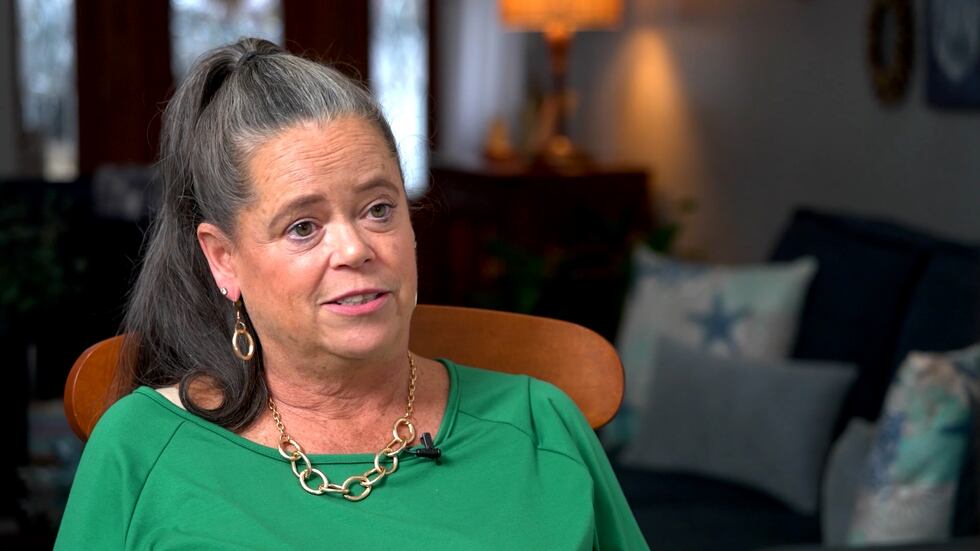
“I mean, our children are our future,” Bartlett said. “I don’t want to see cancer become a bigger issue than what it already is because kids are vaping.”
According to the Centers for Disease Control and Prevention (CDC), more than 1.6 million middle and high school students across the U.S. use e-cigarettes.
In 2024, e-cigarettes remained the most commonly used tobacco product among U.S. youths, with nicotine pouches, which are powders that dissolve in the mouth, taking second place, as reported by the CDC’s Morbidity and Mortality Weekly Report.
Despite a 2019 federal law raising the minimum legal age to purchase tobacco products, including e-cigarettes, from 18 to 21, InvestigateTV found that online sellers continue targeting children through websites and social media.
“A lot of kids are getting them illegally, I mean, you can go online and buy stuff online,” Barlett said. “The simple question on the computer says, ‘Are you over 21? Sure, I’ll click yes.’ They’re not going to know one way or the other, right?”
‘Discreet packaging. NO ID’
InvestigateTV tested these claims by exploring social media and online shops. Our team found that it was possible to bypass simple age-verification questions on multiple websites that sell vapes.
Some websites blocked access before purchases could be completed, and a few used age-verification tools like AgeChecker.Net, which cross-checks personal information such as name, age, and address against public records, forcing them to show proof of age upon delivery.
However, many sites made it easy to get around age restrictions. In some cases, no age was ever asked when adding vapes to the cart.
InvestigateTV also found that the rules around social media sales were even less clear.
Our team was able to find and purchase vapes through TikTok Shop, despite the platform stating that these products are prohibited, and that TikTok Shop is only available for users 18 and older, even though the federal law requires buyers to be 21. Sellers often used disguised language like “sensory packs,” “fidget toys,” and “air diffuser” to avoid using the word “vape,” which is a term that violates their guidelines.
One seller explicitly advertised: “Discreet packaging. NO ID. Great office desk fidgets for adults’ stress relief and anti-anxiety.”
Another seller messaged our team privately, saying, “I’m so sorry that the shop was [sic] been shut down. TikTok cancelled your order,” and directed InvestigateTV to purchase the product from an off-site website. The seller added that the new order “will not get cancelled for sure. Discreet packaging. NO ID. And the price is cheaper on my website.”
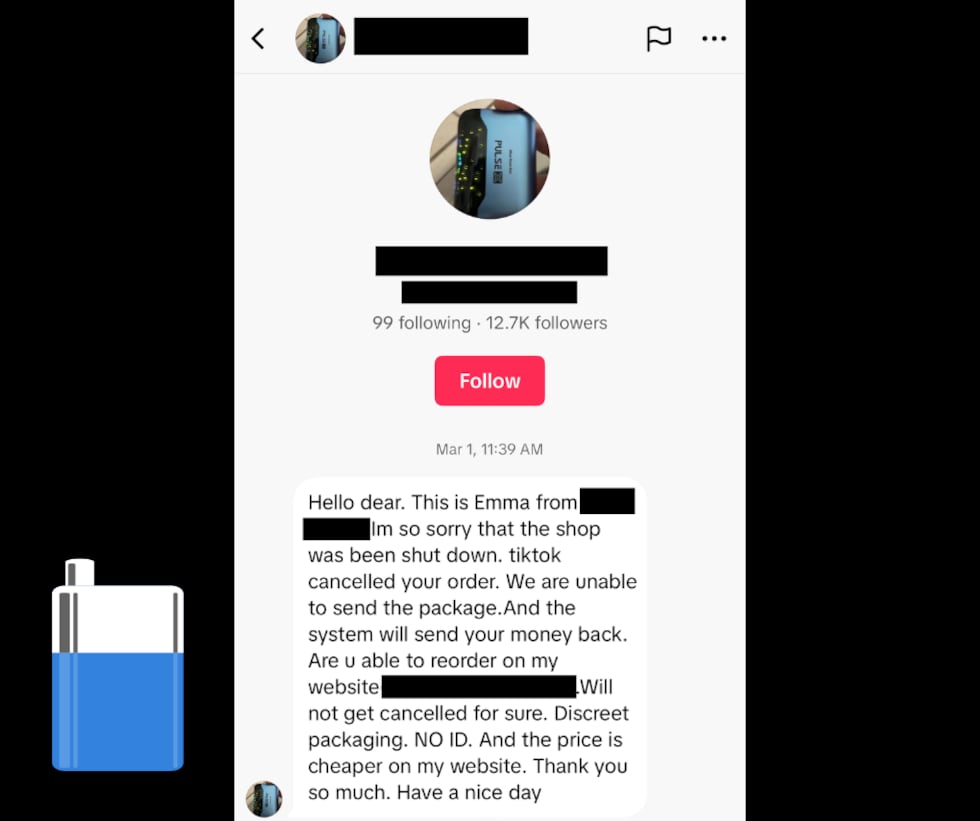
Our team placed an order through the seller’s website, which required no age verification. We also received the originally cancelled TikTok order. Shortly afterward, the TikTok shops we initially purchased from were taken down, and those seller pages were no longer active.
We reached out to TikTok about the products we were able to buy. A spokesperson said, “We strictly prohibit these products for sale on TikTok Shop and have banned the sellers offering the identified products.”
The company also shared more details about its policy, which prohibits the sale of alcohol, tobacco, and e-cigarettes on TikTok Shop.
‘We have a significant problem’
The easy access to vapes doesn’t come as a surprise to Dr. Michelle Peace, who has studied vaping since 2013 and closely monitors the tobacco industry.
“We have a significant problem,” said Peace, a professor in the Department of Forensic Science at Virginia Commonwealth University. “We know that there is a significant number of kids at the high school level that have these products. We know that there are a lot of middle school age kids that have these products. And unfortunately, we’re also getting products shipped to us out of the elementary school.”
Peace and her research team analyze vape products confiscated from schools across Virginia.
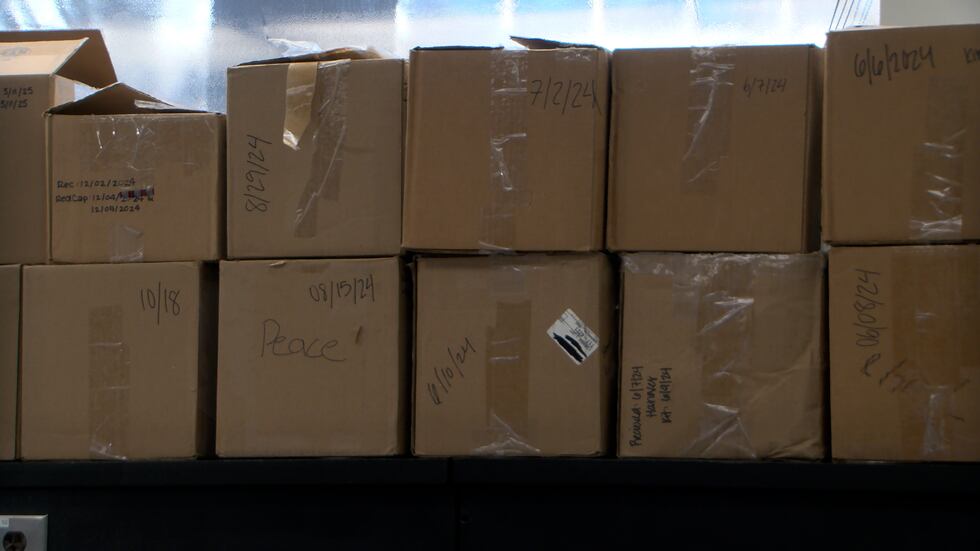
Boxes arrive almost weekly, holding about 30 to 40 vapes each inside a baggie with a kit and a form that helps paint a picture for her team on how teens are getting access to these products.
With funding from the National Institute of Justice and the Virginia Foundation for Healthy Youth, the team studies the chemical composition of e-cigarettes and tracks changes within the vaping industry.
Over the past decade, her lab has analyzed more than 4,000 products. In the fall of 2023 alone, they received more than 630 confiscated vapes from schools. Of those samples, 85 percent contained nicotine and 15 percent tested positive for THC, the active ingredient in marijuana.
“When a school system sends us a kit of devices, we try to analyze them as quickly as we can because we believe that data closest to the moment they were seized or they sent it to us is better data for them to make policy changes,” she said.
Her research also found that the actual nicotine content in these products often exceeds what’s listed on the labels, sometimes even doubling.
“In the early days, in order for me to purchase something online, I had to hold my driver’s license up next to my face, take a selfie with that, and then send them to finish the purchase, now you just have to put in your birth date and that can be fake,” Peace said.
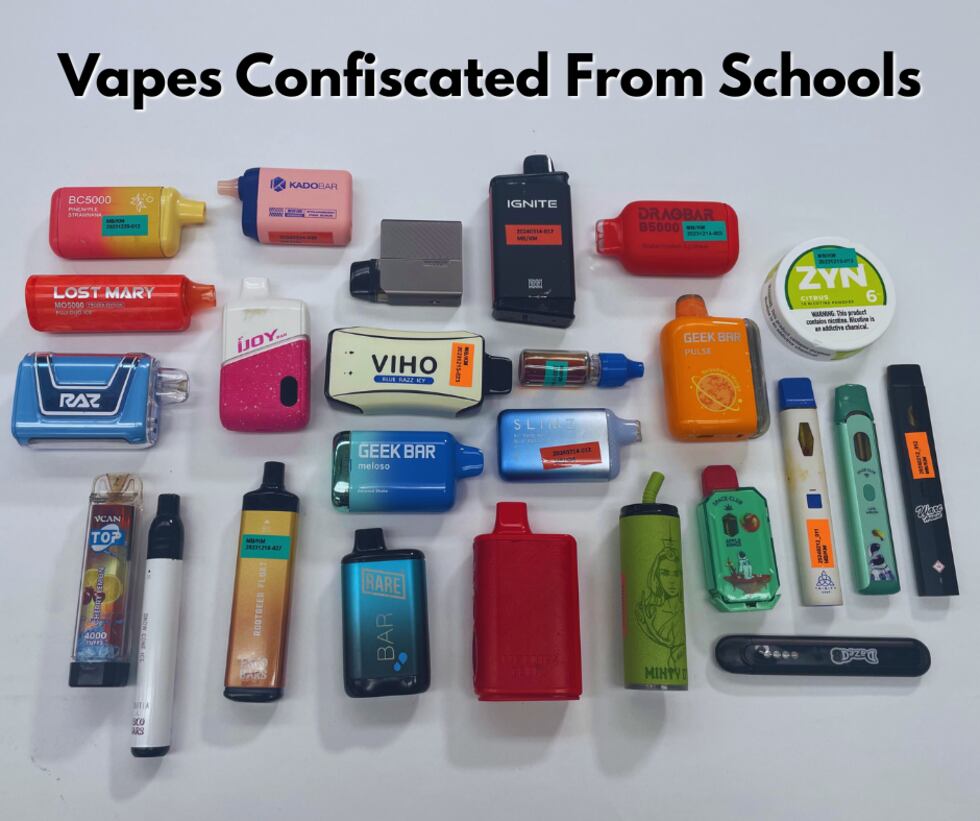
‘The scale of the issue is stunning’
In California, Dr. Eric Leas at the University of California San Diego (UCSD) is leading the Tobacco E-commerce Lab, which investigates policy compliance in vape sales and has found that buying these products online is relatively easy.
“The main finding of that study is that it’s incredibly easy to buy restricted products,” Leas said. “We suspected an issue, but stunning the scale of it.”
Leas’ team ordered 156 flavored vape products online. Of those, 105 were delivered, and only one required an ID scan.
“The regulations themselves I would say are pretty strong. Some of them come with steep penalties. The issue is more that I see is that we aren’t doing anything to enforce them,” he said.
Although mailing vapes via the U.S. Postal Service (USPS) is illegal, InvestigateTV received all vapes purchased from TikTok third-party sellers through the mail carrier. It also delivered 81 percent of the vapes ordered by researchers at UCSD. USPS did not respond to a request for an interview.
FedEx did not respond to our inquiry, but a UPS spokesperson said:
“UPS does not accept shipments of vape products. We proactively work to identify and cancel accounts of shippers who violate our policy. If we learn of any abuse to our shipping restrictions, we investigate and immediately cancel the shipping accounts in violation. In addition, we regularly train our employees on a variety of compliance-related topics, including how to identify and report suspicious shipping activity of vape products.”
‘Vaping in young people is such an epidemic at this point’
Marcy Thornhill works with both youth and adults through her organization, Kollege and Kareer 4 Youth. She’s concerned that the glamorization of vaping in the media has made it a social norm among children.
“The fruity flavors attract children,” Thornhill said. “They attract young people. They taste good, they smell good, just like we did when we were kids with lip gloss, it tastes like grape, right? It’s the same thing?”
She warns that many products in kids’ hands are unregulated and potentially dangerous.
“The scary part of this is, this is unregulated products,” she said. “These are products that are developed by whomever, wherever, and however... they don’t follow any type of federal guidelines and health standards, and your children are able to purchase them.”
She offered the following advice for parents:
- Check Cash App for unauthorized purchases.
- Be alert to fruity smells in children’s rooms.
- Use online parental controls with keywords like “vape.
- Have open, honest conversations about vaping risks.
‘I think the FDA is asleep at the switch’
InvestigateTV shared its findings with Rep. Raja Krishnamoorthi (D-IL), who initiated a youth vaping investigation in 2019 and has continued to urge the FDA to take stronger action.
“I think the FDA is asleep at the switch. I think that’s another instance of the FDA not doing its job,” Krishnamoorthi said.
He’s pressing the agency to stop the flow of illegal vapes from abroad:
“We have to take enforcement action to clear the shelves of these illegal vapes. Only 34 vapes have been approved by the FDA to be sold to consumers. Only 34, so everything else is illegal.”
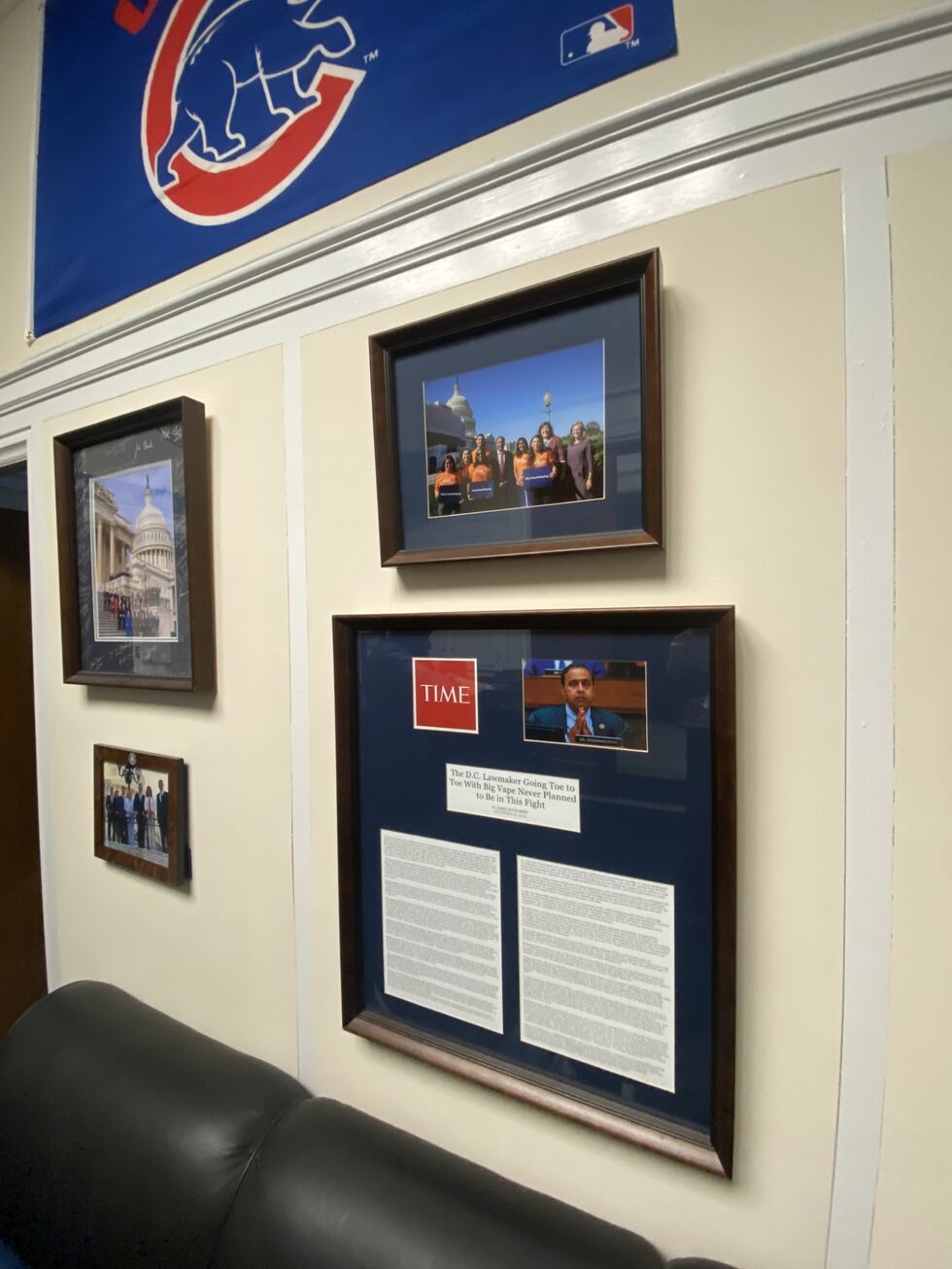
InvestigateTV reached out to the FDA about our findings, the agency verified that to date, only 34 e-cigarette products and devices may be lawfully sold in the U.S. However, researchers tell us there are thousands in the market. To see the FDA’s and TikTok’s full response, see below:
As for Donna Barlett, she’s hoping her son’s story sparks change for more regulation and stricter policies. Her son still battles with his addiction to vaping. Now, she continues to share her letter, “My Son’s Vaping Nightmare,” with lawmakers nationwide, pushing for change and hoping for more research on the long-term consequences vaping can have.
Copyright 2025 Gray Media Group, Inc. All rights reserved.















